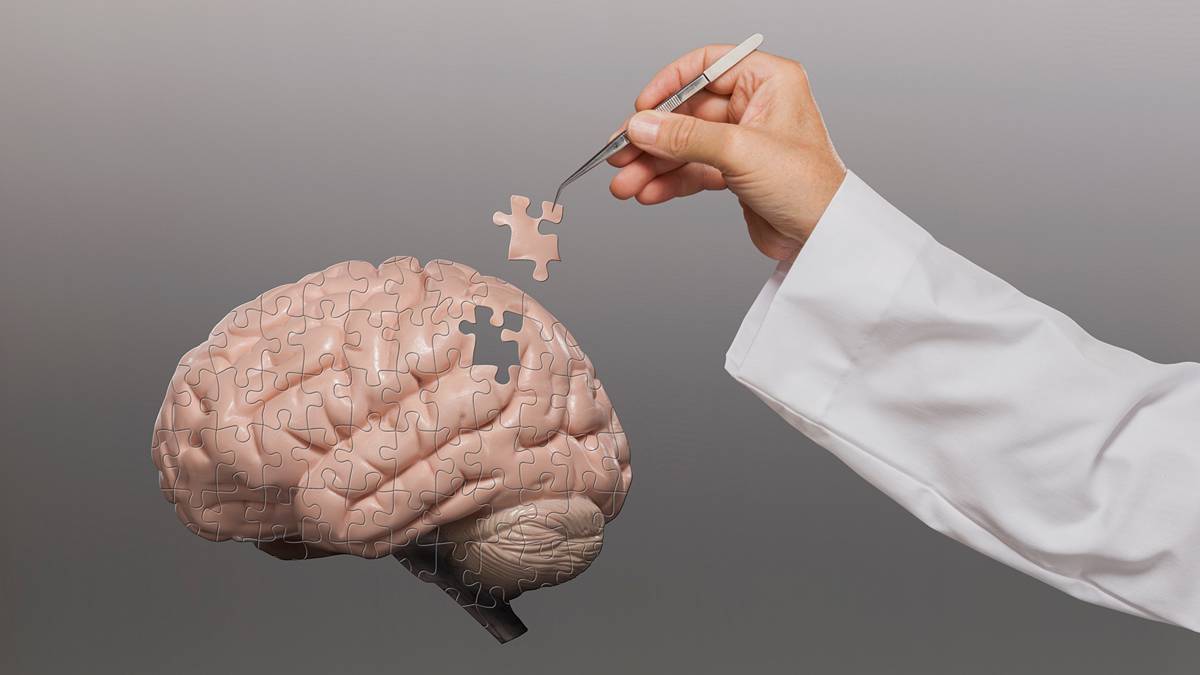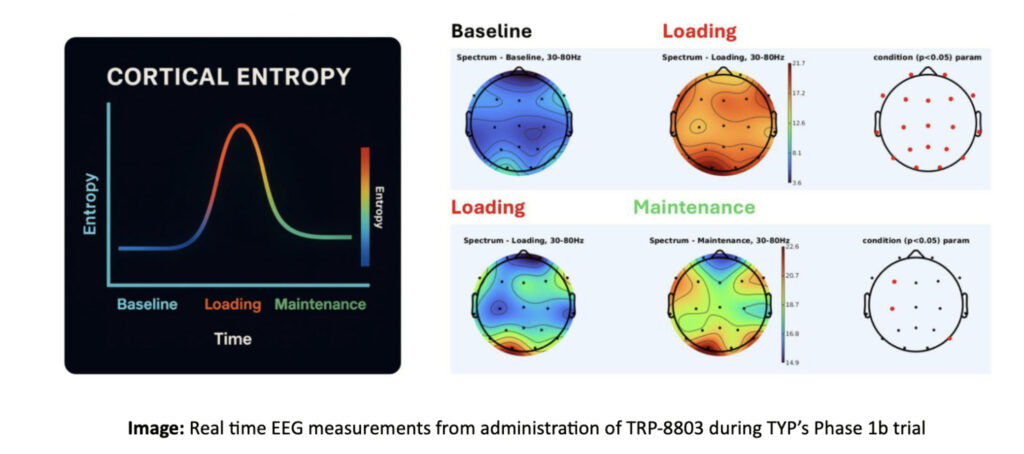Tryptamine secures landmark EEG biomarker deal to advance precision psychiatry

Boosting brain entropy may lead to better patient outcomes. Pic via Getty Images
- Tryptamine inks deal with world leading psychedelic researchers to validate a new EEG-based biomarker platform
- Deal leverages entropy research to predict and optimise therapeutic use of Tryptamine’s IV-infused psilocin formulation
- Development based on theory that psychedelics increase brain entropy, unlocking potential for therapeutic change
Special Report: Tryptamine Therapeutics has struck an exclusive deal with world-leading psychedelic researchers Professor Robin Carhart-Harris and Professor Pedro Mediano to develop a first-of-its-kind electroencephalogram (EEG) based brain entropy biomarker.
Carhart-Harris, who is chair of TYP’s scientific advisory board, and Mediano, of the Imperial College London, will work with Tryptamine Therapeutics’ (ASX:TYP) to develop a proprietary EEG-based platform that will support the ongoing clinical development of the company’s lead product TRP-8803.
TRP-8803 is an intravenously infused (IV) formulation of psilocin designed for controlled and consistent delivery of psychedelic therapy.
Carhart-Harris is a globally recognised leader in psychedelic science, known for pioneering research on how psychedelics affect the brain and their therapeutic potential.
He founded the Centre for Psychedelic Research at Imperial College London and now holds the Ralph Metzner Distinguished Professorship in Neurology and Psychiatry at the University of California, San Francisco.
Mediano is a physicist and a leading figure in computational neuroscience of altered states of consciousness, with his work advancing the theoretical and empirical understanding of how psychedelics can reshape consciousness.
Bringing biomarkers to psychiatry
The initiative aims to establish new frontiers in biomarker-guided precision psychiatry, building a platform to enable clinicians to identify patients most likely to respond to psychedelic intervention and modulate dosing in real time to reach the optimal neuroplasticity window.
Biomarkers have become increasingly important for the approval of new treatments.
Trials of Central Nervous System (CNS) active treatments that use biomarkers have more than a 10-fold higher probability of achieving regulatory approval.
Importantly, pricing of new drugs with companion biomarkers is typically greater than drugs without biomarkers, and intellectual property is significantly strengthened with the use of a companion diagnostic.
In the field of psychiatry, most conditions are still diagnosed with subjective measures that lack precision with biomarkers providing objective proof of treatment effect, helping ensure patients receive the right therapy.
Tryptamine said brain entropy was emerging as a promising physiological marker of brain health and activity with the collaboration designed to generate the clinical data needed for regulatory validation.
Boosting brain entropy for better patient outcomes
Tryptamine’s companion biomarker program builds on the Entropic Brain Hypothesis, pioneered by Carhart-Harris, and combines machine learning algorithms with closed-loop EEG monitoring to pinpoint the ideal therapeutic zone for TRP-8803 infusion.
The end goal is a diagnostic tool that delivers quantitative, regulatory-grade measures for mental health — setting a new benchmark in psychiatry.
The Entropic Brain Hypothesis proposes that cognitive flexibility and the richness of conscious experience are linked to the entropy — or variability — of brain activity.
In normal waking states, entropy is low, supporting ordered, stable thought with mental illnesses often involving overly rigid brain activity.
Tryptamine said psychedelics such as TRP-8803 boosted entropy, moving brain activity into a more dynamic sweet spot between order and complexity.
By helping unlock rigid neural patterns seen in various mental health conditions, connectivity becomes flexible and open to change, offering a pathway to therapeutic benefit.
Building on previous psychedelic-induced entropy work
Tryptamine has already explored psychedelic-induced entropy, delivering promising connective network reorganisation in animal models and conducting EEG measurements in its phase 1b trial of TRP-8803.
In the phase 1b trial, spectral power was significantly higher across all EEG electrode points during the loading dose phase compared to baseline, highlighting strong biomarker potential of Carhart-Harris’ Entropic Brain Hypothesis.

Platform development will start in September, drawing on data from Tryptamine’s previous animal modelling and phase 1b trial.
The dataset is set to be further bolstered by additional EEG data from TYP’s upcoming clinical trial of TRP-8803 for binge eating disorder along with future clinical studies.
The company said it was well-funded for the platform development with cash in bank, its R&D loan facility and receipt of its pending FY24 R&D tax incentives.
The agreement has an initial one-year term, with the option to extend for a further year.
Under its terms, Tryptamine will pay US$100,000 per annum for the services provided. Subject to shareholder approval, the company will also issue one million options each to Carhart-Harris and Mediano, exercisable at eight cents and expiring two years from the date of issue.
‘Potential to transform psychiatry’
Carhart-Harris said the Entropic Brain Hypothesis highlighted how shifts in brain dynamics could shape mental health and wellbeing.
“To have secured an agreement with Tryp to develop a specific biomarker anchored in this framework has the potential to transform psychiatry and marks an important step in translating complex neuroscience into practical tools for real-world care,” he said.
“By creating a measurable signal of brain entropy, we unlock the possibility for personalising treatments and predicting therapeutic response – allowing for more effective interventions for patients in need.”
CEO Jason Carroll said the agreement with two of the world’s foremost experts in neural entropy and psychedelic research marked a transformational step in advancing mental health care.
“By linking precision IV-infusion and entropy to clinical response, we aim to combine traditional, subjective patient efficacy endpoints with dynamic, data-driven biomarkers to generate true quantitative outcomes of efficacy and safety,” he said.
Mediano also highlighted the unique opportunity the collaboration presents for development of psychiatry.
“Tryp’s data offers an unprecedented opportunity to apply our research and maximise the benefits of psychedelic therapy,” he said.
“I’m thrilled to work with Jason and the team to push the boundaries of computational neuropsychiatry and accelerate this very necessary research.”
This article was developed in collaboration with Tryptamine Therapeutics, a Stockhead advertiser at the time of publishing.
This article does not constitute financial product advice. You should consider obtaining independent advice before making any financial decisions.
Related Topics

UNLOCK INSIGHTS
Discover the untold stories of emerging ASX stocks.
Daily news and expert analysis, it's free to subscribe.
By proceeding, you confirm you understand that we handle personal information in accordance with our Privacy Policy.








